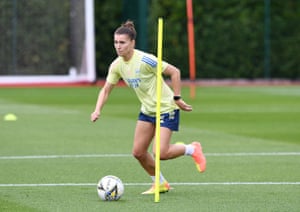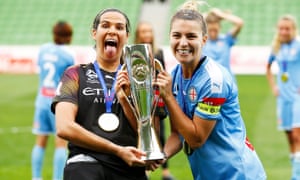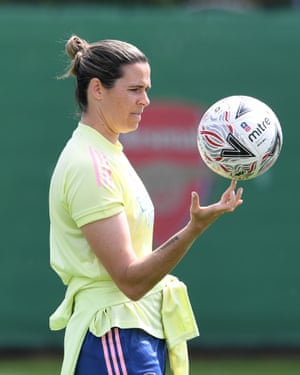“It’s what you want to play for,” says Lydia Williams, shrugging. Williams, one of Arsenal’s two new Australian signings, is calmly discussing their first game for the club. Rather than a cool, leisurely friendly to ease their way in, she and Steph Catley have arrived in north London at the most curious time. They are instead training for Saturday’s postponed Women’s Champions League quarter-final against Paris-Saint Germain with a team who haven’t competed in five months. It is testament to their vast experience that they remain completely unfazed.
“You want to be playing at the highest level in the top competitions,” Williams continues. “I think both of us don’t really know what to expect – it’s new. But we’ve been put in so many situations in our careers that it’s just really taking one step at a time and performing on the day.”
As Arsenal also target a return to the top-two in the Super League, the pair’s experience will likely be pivotal this year. Williams, twice Australia’s footballer of the year, is a 32-year-old goalkeeper who has 88 capsand joined from Melbourne City. Catley, 26, is a full-back with 82 caps having arrived from Reign FC and Melbourne City. Both players know the Arsenal manager Joe Montemurro well, having both worked with him in Melbourne.
“I think my favourite thing about him is that he’s a very good football coach tactically,” says Catley. “He puts on an amazing session, you’re always ready for every game. In that sense he’s a great coach but I think, more importantly, he’s a very good people manager – he cares about the person and not only just the football player. I think that’s really rare for a coach at this kind of level. You don’t find it often.”

A certain trend continues to grow. Williams and Catley follow their new teammate Caitlin Foord and Sam Kerr at Chelsea as high-profile Australians to arrive in the capital over the past year. The decision to compete in the WSL touches on multiple themes, starting with the effect that last year’s World Cup had on how they see their own careers.
“There was a real shift in the teams that we were coming up against and the way that the Europeans were playing,” says Catley. “They were very smart, very technical and very tactical. There were teams that we didn’t expect much from that had jumped levels. It was a big eye-opener for us – that’s where we need to be if we want to be developing and adding things to our game that we didn’t already have from playing in America.”
One of the curiosities of Australian football is that its top players often compete in the National Women’s Soccer League in theUS before being loaned back to Australian teams during the off-season. It allows them to help their domestic league grow, but there is naturally an inner conflict at play. While they desperately want to help out at home, competing all year round comes at a significant cost.
“It’s pretty brutal,” says Catley. “Most of our national team has probably been doing it for the last six or seven years. It definitely stacks up and it gives you no chance for a break, no chance to refresh or to have an actual pre-season.”
In some ways then, moving to England is a decision to bet on themselves and to prioritise their own development. “I think it’s where you want to be as a footballer, being able to just focus on one team and put all your effort [into it],” Williams says. “It’s a little thing but be able to unpack your bags and get settled in the place, knowing you don’t have to up and leave after four months or six months? A lot of us have had to do that over the past couple of years and it’s amazing how unsettled you get.”

By ensuring that they get the best conditions to improve, they automatically offer the Matildas a better chance of success with the Olympics and a home World Cup on the horizon. “I think a lot of us realise that for ourselves individually but also with the Matildas it was important to get new experiences and also start to really look after our bodies. It helps make sure we get that break so that we can reset and prepare ourselves for a proper season and then hopefully come back stronger and more prepared for the next major tournaments.
The Matildas were ranked as the most popular Australian national sporting team in a survey last year. For many of their current players, the visibility of women’s football is unrecognisable compared to in their youth. Catley grew up playing football with boys around her neighbourhood and it was not until she was given a trial with a girls’ representative team in Victoria aged 11 that she learnt that there was a pathway for herself as a female footballer.
“I actually started crying, bawling my eyes out, because I thought that meant that the boys’ team didn’t want me any more,” she says. “My coach explained to me that it was a very good thing and it could lead to this, this and the Matildas. I had no perception of that being an option before that day.”

For Williams, the disconnect was even deeper. She is a sporting icon in her own country having grown up in Kalgoorlie, a small mining town in Western Australia, to an American mother and an Indigenous Australian father. Born into a missionary family, they would spend a month of each year travelling around communities in the bush in order to preach and help poor communities. Williams’s first love was Australian rules football. When her family moved to Canberra, that was not an option at school so she chose the closest sport possible, football, and has never looked back. “It was definitely a unique childhood,” she says. “It’s pretty crazy that’s how I lived for a while.”
This week Williams and Catley hope to try something else new, playing in the Champions League. It is a challenge they seem ready for and PSG should take heed.
from Football | The Guardian https://ift.tt/3g2nIGW
via IFTTT

No Comment